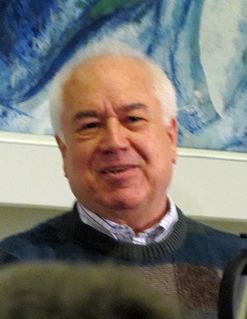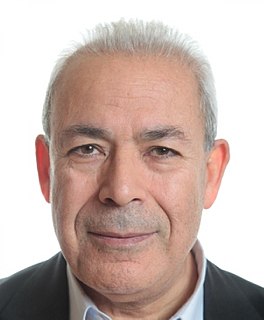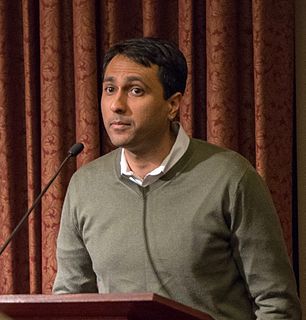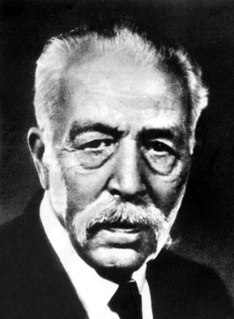Ein Zitat von Raimon Panikkar
Die Selbstidentität des Menschen ist transkulturell und kann daher keinen einzigen Bezugspunkt haben. Pluralismus ist nicht gleichbedeutend mit Toleranz gegenüber unterschiedlichen Meinungen. Pluralismus bedeutet die Anerkennung des Undenkbaren, des Absurden und bis zu einem gewissen Grad Unerträglichen. Die Realität an sich muss nicht transparent und verständlich sein.
Themen zitieren
Verwandte Zitate
Pluralismus und Toleranz sind Grundpfeiler der modernen Gesellschaft. Das muss akzeptiert werden. Aber Pluralismus bedeutet nicht nur Vielfalt. Das bedeutet, dass wir dieselben Regeln und Werte teilen und dennoch unterschiedlich sind. Der Islam hat diese Idee nicht. Und auch der Islam hat keine Tradition der Toleranz.
Als ich hierher [nach Malaysia] kam, hörte ich, dass es ein Problem mit dem Konzept des Pluralismus gibt, bei dem Pluralismus sehr eng verstanden wird, was meiner Meinung nach falsch ist. Dies soll nicht Ihren Sinn für die Wahrheit Ihrer Überzeugungen schmälern, sondern die Tatsache anerkennen, dass wir in einer Welt leben, in der wir uns mit Pluralismus auseinandersetzen müssen. Es ist eine Tatsache.
Ich glaube an ein Indien des Pluralismus und der Vielfalt, nicht an religiöse Bigotterie und Kastenpolitik. Ich glaube an ein Indien, das in sich selbst sicher ist und sich seines Platzes in der Welt sicher ist, ein Indien, das ein stolzes Beispiel für Toleranz, Freiheit und Hoffnung für die Unterdrückten ist.
Wenn man menschliches Wissen nicht vollständig von der ursprünglichen Selbsterkenntnis und der daraus resultierenden Offenbarung Gottes an den Menschen abhängig macht, muss der Mensch das Wissen in sich selbst als letzten Bezugspunkt suchen. Dann muss er sich um ein umfassendes Verständnis der Realität bemühen. Er wird sich darüber im Klaren sein müssen, dass er überhaupt kein wahres Wissen über irgendetwas hat, wenn er nicht zu einem derart umfassenden Verständnis der Realität gelangen kann. Entweder muss der Mensch dann alles wissen, oder er weiß nichts. Dies ist das Dilemma, mit dem jede Form nichtchristlicher Erkenntnistheorie konfrontiert ist
Wir müssen uns vom Vorrang der Technologie hin zu Überlegungen zu sozialer Gerechtigkeit und Gerechtigkeit bewegen, von den Geboten organisatorischer Bequemlichkeit hin zu den Bestrebungen der Selbstverwirklichung und des Lernens, von Autoritarismus und Dogmatismus hin zu mehr Beteiligung, von Einheitlichkeit und Zentralisierung hin zu Vielfalt und Pluralismus. weg vom Konzept der Arbeit als hart und unvermeidbar, vom Leben als hässlich, brutal und kurz hin zur Arbeit als Zweck und Selbstverwirklichung, einer Anerkennung der Freizeit als einer an sich gültigen Aktivität.
Technisch gesehen tut der moderne Mensch alles, was er kann – er funktioniert nach diesem einzigen Grenzprinzip. Der moderne Mensch, der sich selbst als autonom sieht und keinen persönlich-unendlichen Gott hat, der gesprochen hat, verfügt über kein adäquates Universelles, um eine adäquate zweite Randbedingung zu liefern; und der gefallene Mensch ist nicht nur endlich, sondern auch sündig. Somit haben die pragmatisch getroffenen Entscheidungen des Menschen keinen Bezugspunkt, der über den menschlichen Egoismus hinausgeht. Es heißt: Hund frisst Hund, Mensch frisst Mensch, Mensch frisst die Natur.
Ein Sozialunternehmer ist jemand, der weiß, wie man eine Idee in die Realität umsetzt, und eine der großartigen Ideen unserer Zeit ist Pluralismus. Können Menschen unterschiedlicher Herkunft in gegenseitigem Frieden und Loyalität zusammenleben? Und was wir brauchen, ist eine Generation junger Sozialunternehmer, die wissen, wie man diese großartige Idee in einem historischen Moment in die Realität umsetzt, in dem religiöse Extremisten, offen gesagt, ihre Idee in die Realität umsetzen.
Wenn ein Mann ein Identitätsgefühl hat, das nicht darauf angewiesen ist, von jemand anderem gestützt zu werden, kann es auch nicht von jemand anderem untergraben werden. Wenn eine Frau ein Identitätsgefühl hat, das nicht davon abhängt, diese Identität bei jemand anderem zu finden, kann sie ihre Identität bei jemand anderem nicht verlieren. Und so kehren wir zur zentralen Tatsache zurück: Es ist notwendig, es zu sein.
Ich denke, dass junge Menschen die Arbeit am Pluralismus aus zwei Gründen fortsetzen werden. Erstens, weil es die Realität der Welt ist, in der sie leben, und ich denke, junge Menschen mit unterschiedlichem Hintergrund fragen sich: Was bedeutet es für mich, Buddhist zu sein und mit einem Baptisten befreundet zu sein?





































